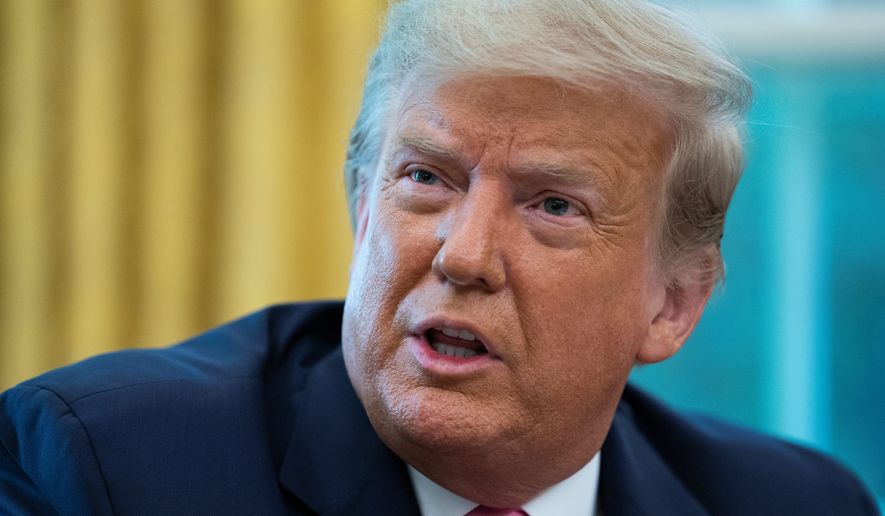German politicians representing areas where large numbers of American military personnel are based want Congress to force President Trump to back down on his plans to withdraw almost 10,000 U.S. troops from Germany.
The troops represent the “backbone of the U.S. military presence in Europe and NATO’s ability to act,” the governors of Bavaria, Hesse, Baden-Wuerttemberg and Rhineland-Palatinate wrote in a letter sent recently to more than a dozen U.S. lawmakers.
Among those who received it were several influential Republicans, including Sen. Jim Inhofe from Oklahoma, who is both a strong ally of President Trump and chairman of the Senate Armed Services Committee.
While there was no immediate comment on the letter from Capitol Hill on Monday, several members of Congress have previously spoken out against Mr. Trump’s troop withdrawal plan, including some prominent Republicans.
In June, Mr. Trump ordered the American troop presence in Germany to be reduced from about 34,500 to 25,00. The president has said he wanted the numbers reduced because Germany takes advantage of the U.S. in trade policy and won’t sufficiently invest in its own defense.
Luke Coffey, a foreign policy expert with the Heritage Foundation, said Mr. Trump has a point about Germany’s lack of defense spending. But, in an interview with The Washington Times, Mr. Coffey said such factors shouldn’t warrant a U.S. pullout.
SEE ALSO: Mitt Romney slams Germany troop withdrawal as ‘slap in the face’ to ally
“I think there are plenty of good reasons to keep U.S. forces in Europe. I would like to see them increased,” he said, asserting the U.S. military presence in Germany protects Americans interests in Europe by strengthening allies and deterring adversaries.
The letter from the German governors draws attention to the Landstuhl Regional Medical Center and the Grafenwoehr training area as constituting essential to the U.S. presence in Europe, according to a copy obtained by The Associated Press. Americans and Germans have worked together for decades to develop those structures, along with the headquarters for the U.S. European Command, the governors wrote.
“They provide the necessary foundation for a partnership-based contribution to peace in Europe and the world, to which we all share a common commitment,” they wrote. “We therefore ask you to support us as we strive not to sever the bond of friendship but to strengthen it and to secure the U.S. presence in Germany and Europe in the future.”
Domestic political considerations and the need to placate constituents is more likely at the center of the letter from the German chief ministers than geopolitical strategic concerns, said Mr. Coffey, who noted the loss of 10,000 well-paid American military personnel would be a major hit to the economies of the four German regions represented in the letter.
At the same time, Mr. Coffey argued such considerations also should not be a factor in weighing the strategic value of U.S. troops in Germany.
Sen. Mitt Romney, Utah Republican and one of Mr. Trump’s most ardent political foes, was one of the recipients of the letter. He was already firmly opposed to the president’s order — having called it a “gift to Russia” — and last month introduced an amendment to the Fiscal Year 2021 National Defense Authorization Act aimed at blocking any serious withdrawal of U.S. personnel from Germany.
“In addition to undermining our NATO alliance, a withdrawal would present serious logistical challenges and prevent our military from performing routine military readiness exercises,” Mr. Romney said on introducing the measure.
Final details around Mr. Trump’s troop withdrawal plan remain murky.
Pentagon officials have not indicated which troops would be moved and what their next location would be. Some are expected to be transferred east, possibly to Poland which has been constructing facilities in hope of an influx of American military personnel. Most are expected to move back to the U.S.
There is precedent, meanwhile, for foreign politicians to try and play the U.S. legislative and executive branches off each other on sensitive national security matters. In March 2015, Israeli Prime Minister Benjamin Netanyahu was invited to speak before a joint meeting of Congress in opposition to the Obama era Iranian nuclear negotiations. Some saw it as a breach of diplomatic and political protocol.
While the German politicians may be attempting a similar end run around the White House with their letter to U.S. lawmakers, Mr. Coffey said Mr. Trump may not even have been made aware of the attempt.
“I’m not even sure this will be raised to his level in terms of briefings,” Mr. Coffey said. “But if [German chancellor Angela Merkel] starts firing off letters to various senators and congressmen, that would change.”
• Mike Glenn can be reached at mglenn@washingtontimes.com.




Please read our comment policy before commenting.